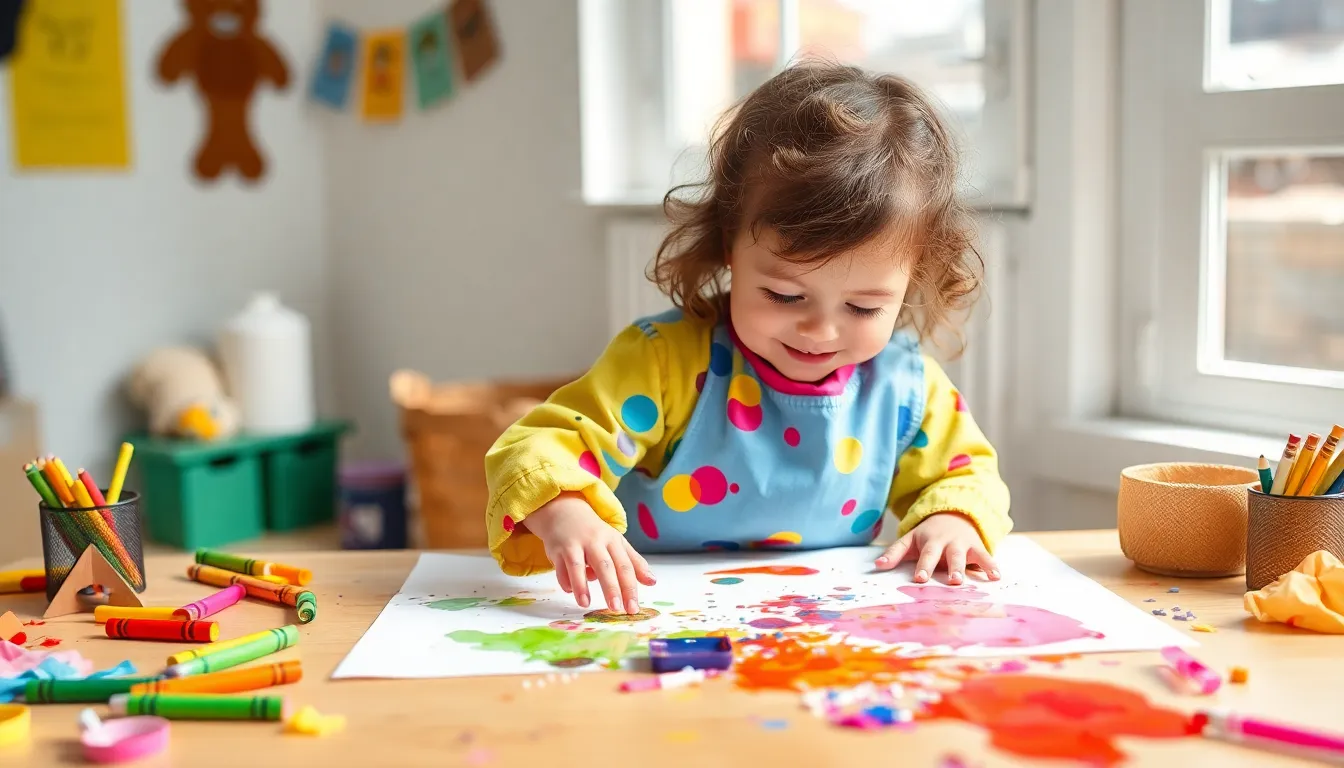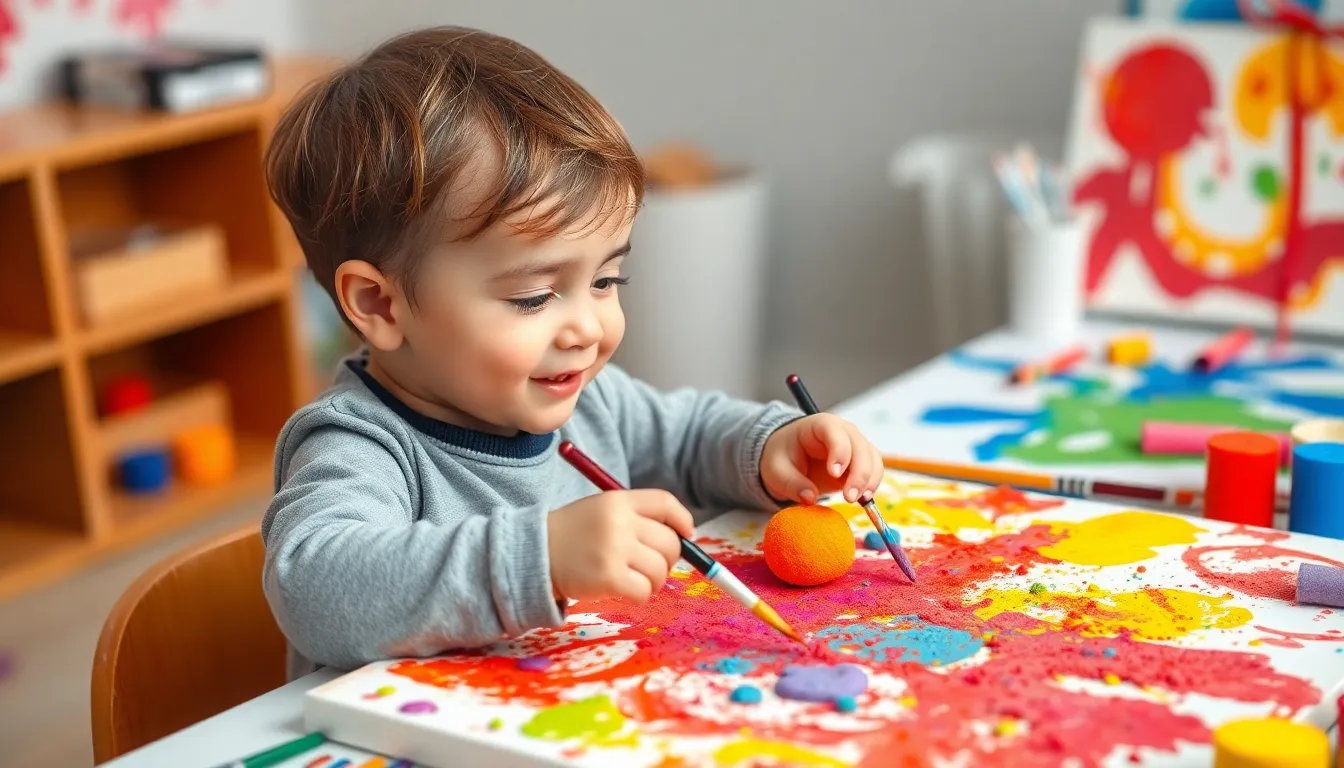Phone:
(701)814-6992
Physical address:
6296 Donnelly Plaza
Ratkeville, Bahamas.

Toddlers are natural creators, turning every crayon and finger paint into a masterpiece. Process art for toddlers isn’t just about the final product; it’s a delightful journey of exploration and self-expression. Imagine tiny hands splattering vibrant colors, mixing textures, and even tasting a bit of glue—who knew art could be so messy and tasty?
Process art for toddlers emphasizes the experience of artistic creation instead of the final product. Engaging with materials like crayons, finger paints, and clay allows toddlers to explore colors, shapes, and textures freely. This form of art encourages self-expression, where every brush stroke represents a unique journey of discovery.
Children interact with various mediums without the pressure of adhering to strict guidelines. Sensory exploration plays a significant role, as toddlers learn through touch and sight. They gain insights into their creative preferences while experimenting with different artistic tools and techniques.
Art activities can involve messy experiences, highlighting the importance of exploration over neatness. For instance, finger painting lets toddlers feel the textures as they mix colors, creating an organic learning environment. Each artistic endeavor fosters critical thinking and problem-solving skills, enhancing cognitive development.
Through process art, caregivers and educators can encourage decision-making. Selecting colors or deciding on the materials to use empowers toddlers, boosting their confidence. As they engage in artistic play, children form connections with their creations, nurturing a sense of ownership and pride.
Art doesn’t need a prescribed direction in this approach. It thrives on spontaneity and creativity, leaving room for surprises in every artwork created. Process art for toddlers cultivates a love for artistic exploration, setting a foundation for lifelong creativity and self-expression.

Process art offers numerous advantages for toddlers, emphasizing exploration and creativity. Engaging in these artistic activities fosters valuable skills and self-expression.
Creativity thrives in an open environment, and process art provides that space. Toddlers experiment with colors, materials, and techniques, allowing their imaginations to guide their creations. Each artistic endeavor promotes original thought and encourages unique ideas. Exposure to various art tools, like brushes and sponges, broadens their understanding of texture and form. As children manipulate these items, they forge connections between concepts, fostering inventive thinking. Process art nurtures their ability to approach problems from different angles, enriching their cognitive development.
Fine motor skills gain significant benefits from process art activities. Toddlers grasp tools like crayons and scissors, enhancing hand-eye coordination with every stroke and cut. Manipulating materials such as clay or playdough strengthens their fingers and hands. As children engage in tasks like pouring, squeezing, or gluing, they refine their dexterity. The repetitiveness of these actions builds muscle memory, promoting independence in everyday tasks. Fine motor development during these activities lays a foundation for future skills, including writing and typing.
Process art encompasses various activities that nurture creativity in toddlers. Engaging toddlers in diverse arts fosters exploration and discovery.
Painting invites toddlers to experiment with various tools. Brushes of different sizes, sponges, and even hands create unique patterns and textures. Each tool encourages exploration, allowing children to experience how different techniques affect their artwork. With paint occupies their canvas, toddlers learn about color mixing and layering. This activity builds fine motor skills as they maneuver tools with dexterity. Encouraging the use of unconventional items, like feathers or leaves, enhances their sensory experience further. Overall, painting engages toddlers and nurtures their artistic expression.
Collage making offers toddlers a chance to explore materials freely. Using paper, fabric, and natural items encourages creativity while promoting decision-making skills. Selecting and arranging objects allows children to experiment with composition and design. This activity sparks discussions about colors, shapes, and textures. Layering different materials fosters spatial awareness and enhances fine motor development through cutting and gluing. It inspires toddlers to think outside the box, leading to unexpected artistic outcomes. Additionally, collage making cultivates collaboration when working with peers, sparking social development alongside creativity.
Encouraging process art in toddlers nurtures creativity and self-expression. Several strategies can enhance this artistic journey.
Creating a safe space fosters exploration and creativity. Set up an area where messiness doesn’t cause concern. Cover surfaces with newspapers or plastic sheeting to simplify clean-up. Keep all supplies readily accessible so toddlers can select materials as they wish. Ensure supervision is present to promote safety while they experiment. A relaxed atmosphere allows for spontaneous creativity to flourish.
Using open-ended materials sparks imagination and engagement. Choose items such as fabric scraps, buttons, and natural objects like leaves and rocks. Such materials encourage toddlers to explore various textures and forms without limitations. Paintbrushes, sponges, and even their hands serve as tools for creative discovery. Recognizing their own preferences and choices empowers toddlers during artistic activities. This freedom enhances their confidence, leading to original expressions in their artwork.
Process art for toddlers is a vital avenue for self-expression and creativity. By focusing on the artistic journey rather than the end result, toddlers gain confidence and develop essential skills. Engaging in activities like painting and collage making allows them to explore textures and colors freely.
Caregivers and educators play a crucial role in creating a supportive environment that encourages exploration and decision-making. This not only nurtures creativity but also enhances fine motor skills and cognitive development. Embracing the messiness of process art fosters a love for artistic exploration, laying the groundwork for lifelong creativity. Ultimately, process art cultivates a sense of ownership and joy in young children’s artistic endeavors.